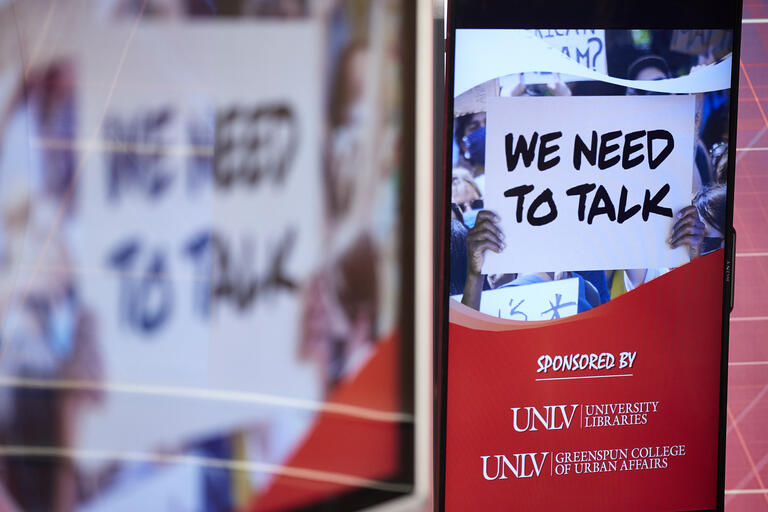Allison Slaughter was afraid to become a social worker. She was drawn to social work courses as she worked on her bachelor’s degree in sociology but worried she’d become overwhelmed with heartbreak for future clients if she pursued it as a career.
“Sometimes we have to use fear as a motivator,” she said. “I didn’t know if I would take on a lot of emotional baggage. Making sure I didn’t take that home was something I was worried about.”
Slaughter now expects to graduate this spring with a master's degree in social work, thanks in large part to the field experiences integrated into the UNLV School of Social Work’s programs.
The experiences help students identify early on whether or not they truly enjoy social work, said Marde Closson, the school's field education director. The program operates like a job market with students applying for positions online through approved employers.
Social work isn’t for everyone. The field, Closson said, often requires compassion, patience, dedication, and an ability to separate oneself from the heavy emotional toll of some of the work.
Slaughter said her moment of clarity came a few months into a practicum experience at Behavioral Services of Nevada, where she spent 300 hours in the fall assisting with and observing everything from group therapy to psycho-education of children.
“It’s my first time experiencing that individual person-to-person interaction and being able to talk to someone about problems they may be experiencing in life,” she said. “It’s also my first time working actively with children. All of these factors created this perfect ecosystem of, ‘Oh my God, how did I not realize this before?’”
An Advantage in the Job Market
Employers who take on social work students benefit from the program by connecting with prospective employees, training them to the company’s specifications, and potentially hiring those students in the future.
At any given time, the university has about 225 social work students, including both undergraduate and graduate, at practicum sites including the Clark County School District, Seven Hills Hospital, Southern Nevada Adult Mental Health Services, the Department of Veterans Affairs, and local private practices.
Before students have even received their degrees, they are making an impact in the community, Closson said. Bachelor’s students complete two practicums their senior year, totaling 480 hours. Master’s students, depending upon their status in the program, complete 225 hours or 300 hours per semester. Combined, UNLV students provide more than 100,000 hours of service annually to the community, almost entirely free of charge.
“You can study social work all you want to in the books, but until you get into the field, you don’t really have a good understanding,” Closson said. “This offers a protected environment for that learning. Students are able to observe, see how social work is practiced, and start doing.”
Slaughter agreed. “The benefit of having these field practicum exercises is that I’m putting all the knowledge I have into this,” she said. “I’m drawing the connections. I’m trying to implement what I see, and I’m so intellectually curious that I’m going to research further.”
Fellowship Award
Slaughter became the second UNLV student to be awarded the yearlong Council on Social Work Education's Minority Fellowship Program-Youth. She received a monetary stipend and access to online resources targeted at working with children at risk for mental health or substance abuse issues. She’ll also attend a training seminar in Virginia along with other national recipients to heighten her cultural competency when working with ethnic and racial minorities.
“I’m excited,” Slaughter said. “Everything I wanted to do in my educational career is in this fellowship.”
Between Slaughter’s practicum and the fellowship, she’ll be well prepared to serve Las Vegas’ high population of homeless youth and adolescents, Closson noted.
“One of the biggest needs we have in Las Vegas is providing behavioral health services to youth between 12 and 25 or 26,” she said. “We believe that if we could provide services to those individuals when they’re young, it will help prevent further issues and needs into adulthood.”


